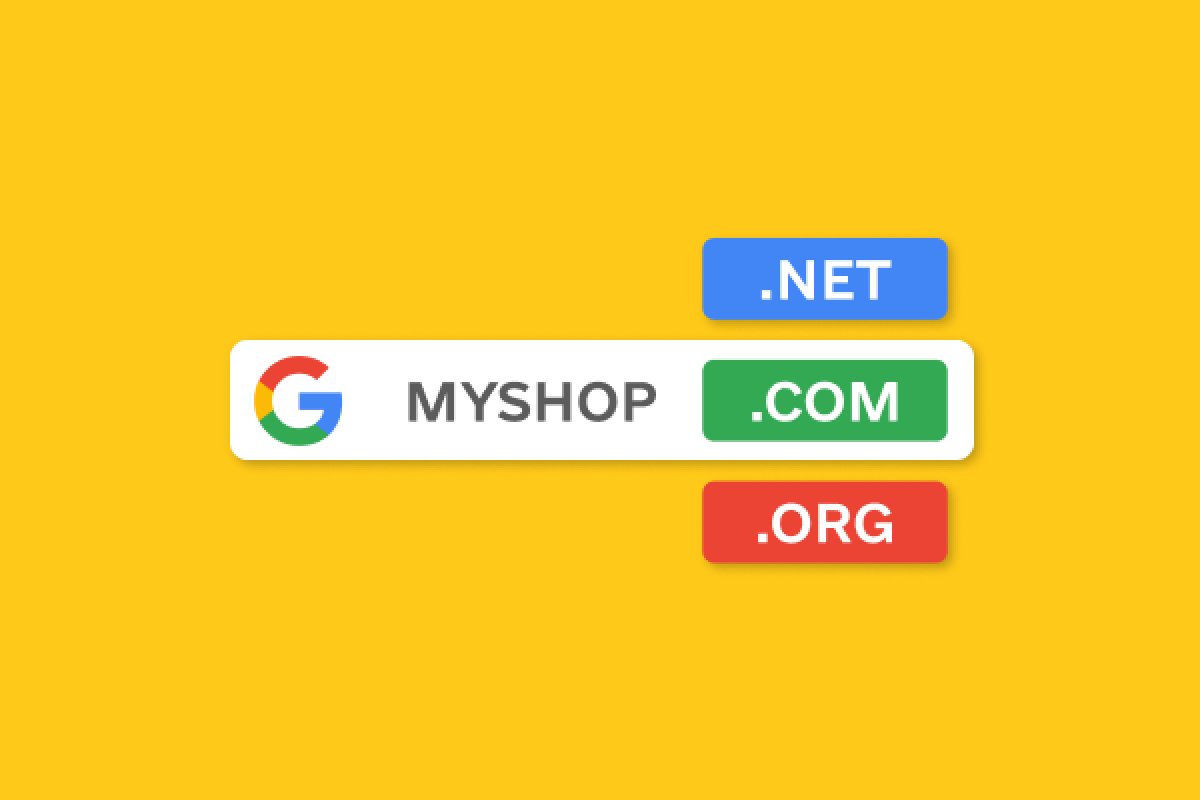Choosing a good name for an online store is difficult and can take a lot of time. We have written an article that will simplify your choice.
The name of your online store is the first thing customers see and what they will remember. The right choice determines how easily you can be found on Google, how effective your advertising will be, and how quickly your brand recognition will grow.
In this article, we will explain in detail how to come up with a strong, original, and legally protected name that will contribute to your success. And if you are only planning to launch your business, be sure to read our guide on creating an online store.
Criteria for a successful online store name
A good name for an online store is more than just a word. It is part of your brand, the first thing customers notice, and what they remember most. To choose a name that truly works for you, it is important to follow a few simple but essential criteria.
Simplicity and brevity
The name should be short and easy to grasp. People are more likely to remember a store called «Overstock» or «Walmart» than «Everything for the home, garden, and yard.» Experience shows that successful stores usually have names consisting of one or two words: the shorter the name, the easier it is for customers to recall.
Ease of pronunciation and spelling
Always check whether your chosen name is easy to pronounce and spell. Customers should not have to guess how to type it into a search bar or explain it to friends. If you choose a word that is too complicated, there is a risk people will quickly forget it or fail to understand it at all.
Relevance and associations
It is helpful if the name immediately conveys what your store is about. The name does not need to be directly descriptive, such as «clothing store» but ideally it should create the right associations for potential customers. For example, Coffee Republic instantly evokes images of coffee, comfort, and atmosphere.
A successful name can even build an emotional connection with your brand. People tend to remember what they like or what sparks certain emotions — curiosity, admiration, trust, or positivity.
Uniqueness and recognizability
The global market already has thousands of stores with identical or similar names. When naming your store, uniqueness should be a priority. Overly generic words like «Shop» or «Market» get lost among competitors.
Uniqueness also helps you avoid confusion. For instance, the name «Bucksstar Coffee» deliberately echoing Starbucks, would look like a copy and raise doubts. It is better to come up with something original, even if it seems unconventional at first.
Avoiding negative associations
Even if a name sounds appealing, make sure it does not carry negative meanings in other languages. Foreign words that translate to something like «down» or «bad» can subconsciously trigger unpleasant emotions in customers. Ideally, your store name should have a neutral or positive meaning.
Domain and online presence
Today, a store’s name almost always matches its domain. Make sure your chosen name looks good as a web address: it should be short, without hyphens, numbers, or complicated letter combinations. Imagine your store is called «Bambi», but the domain is «thingsforkids.eu». That is not intuitive and will only confuse people. Someone who hears your store’s name should be able to easily find it by typing it into the address bar or searching on Google. Always check domain availability when choosing a name. It is also helpful if you can register the same name for your social media pages on platforms such as Facebook, Instagram, and TikTok.
To ensure that your chosen name is not already in use by another well-known store or company, simply search it on Google. This will give you a quick idea of how unique the name is and whether it might be confused with other brands. It will also help you avoid unpleasant surprises after launching your store.
Methods and Approaches to Creating a Name
There are various approaches to naming — from classic, time-tested methods to creative and unconventional ones. Often, the best results come from combining several techniques.
Brainstorming
Brainstorming is the simplest and at the same time one of the most effective methods. Gather your team, friends, or simply sit down with a sheet of paper and write down as many words and ideas as possible that are associated with your store or products. Record absolutely every idea, even those that may seem odd or trivial. You can also use supporting tools such as online dictionaries or name generators. For example, for a camping goods store, words like «adventure», «hike», «travel», and «tent» may work. The goal is to create a large pool of words from which you can later select the best options.
Associative approach
This method is similar to brainstorming, but here the focus is on building associations. Choose a key word that characterizes your product or niche, and then write down all the associations it brings to mind. For example, if you own a coffee shop, the key word might be «coffee». From there, you can build associations such as «morning», «aroma», «energy», «Italy», «coziness». These associations can inspire strong name ideas: Morning Energy, Coffee Aroma, Cozy Cup. It is important that the associations are clear to most customers, not just a narrow group of people deeply familiar with the subject.
Using synonyms and new words
Once you have a list of base words, try finding synonyms for them or creating new words by combining parts of existing ones. For example, Netflix is a new word formed from Internet + Flicks. Such names sound fresh and are easy to remember, provided they have a pleasant ring to them.
Rhymes and sound repetition
Names with rhymes or repeated sounds are very easy to remember and quickly become recognizable. Examples of successful names include:
-
Lean Cuisine (the rhyme «-ine» creates smooth pronunciation);
-
Coca-Cola (repetition of the «k» sound);
-
Best Buy (repetition of the «b» sound).
The key is not to overdo it or accidentally create something ambiguous or strange.
Composite names
A mash-up is the creation of a name by combining two words or parts of words. This is one of the most effective ways to come up with a unique and creative name.
Examples:
-
MasterCard («master» + «card»);
-
Pinterest («pin» + «interest»);
-
PayPal («pay» + «pal»).
It is important that such a name is easy to pronounce and does not create unwanted associations.
Acronyms and abbreviations
These are shortened forms created from the first letters of words. Examples include IBM (International Business Machines) and H&M (Hennes & Mauritz). The main advantage of such names is their brevity. At the same time, they may be unclear to customers and difficult to remember if they do not have an easy sound. Acronyms work well only when the brand becomes well-known through strong marketing, as in the cases of KFC or BMW.
Using foreign words
Foreign words can add a special charm to a brand if chosen wisely. Examples of successful use include:
-
Fiesta — a Spanish word associated with celebration and fun;
-
Perfetto — an Italian word that evokes quality and style;
-
Maison — a French word meaning «house» suitable for certain niches.
It is important to choose foreign words that are easy to remember and perform well in Google searches.
Personalized names
This is a classic approach — naming the business after its founder. Examples include Ford and Yves Rocher. When this works:
-
if you already have a personal brand;
-
if it is an author-driven project or handmade goods;
-
if it is part of the concept, as with fashion designers like Chanel or Versace.
In other cases, it is better to choose something more informative and creative.
The best approach is combining methods
The most effective strategy is to combine several of the methods listed above. Usually, the naming process goes through the following stages:
-
defining the brand concept and values;
-
analyzing competitors’ names;
-
generating ideas through brainstorming and associations;
-
selecting the best options and testing them for ease of pronunciation, simplicity, and sound;
-
checking domain and social media availability.
This systematic approach helps create a strong, distinctive, and memorable name that will support your brand for years to come.
Common mistakes when choosing a name
New entrepreneurs often make similar mistakes that prevent a brand from launching successfully. Here are the most common ones to avoid.
The name lacks logic or meaning
Sometimes owners try to be overly creative and end up choosing a name that has nothing to do with the products or the store’s concept. For example, naming a wholesale sock store «Pear» is unclear and uninformative. Why this is a problem:
-
the name without logical connection does not resonate with customers;
-
it is difficult for customers to understand what the store is about.
If you want to use an abstract name like Apple, be prepared to invest significant resources in marketing to explain its meaning to your audience.
The name is too long
A name with four or five words may look nice on paper, but it is difficult to perceive, remember, and fit into a logo or website address. Instead, shorten the name to one or two words. If that does not work, try changing your approach and look for other options.
The name is hard to pronounce or spell
A name should be intuitive. If customers need to ask multiple times how to pronounce or spell it, that will hurt your business.
Using numbers and symbols
Numbers, hyphens, and unexpected symbols in a name create unnecessary barriers to memorability. For example, «Aqua-24-Shop» looks complicated. A number might be justified only in specific cases such as «24» meaning 24/7, but even then, it is better to avoid it. The underscore («_») should never be used: you cannot pronounce it in speech, and it is easy to forget when typing a web address. A clean word without extra symbols is always easier to remember.
Copying well-known brands
Names that resemble popular brands («Zara-shop», «Amazonka») raise customer doubts and mistrust. Shoppers may think your store sells counterfeits or simply confuse it with another brand. In addition, this can lead to legal issues if your brand name is too similar to an already registered trademark.
Excessive banality
Calling a bookstore simply «Books» or a clothing shop «Style» is a poor choice. Such names get lost among hundreds of similar ones. Add an interesting element. For instance, instead of «Flowers», «Flower Fairy» would be more distinctive. Also avoid pompous words like «VIP», «super», or «best» as these often trigger ironic reactions from customers.
How to avoid mistakes
Simply check your name against the following checklist:
-
Is the name short enough?
-
Is it easy to pronounce and spell?
-
Does it have a logical connection to your products?
-
Does it avoid negative associations?
-
Is it unique and not too similar to other brands?
It is also useful to show the name to several people and ask what associations it brings to mind. Often, those not involved in the naming process will notice things you might have overlooked.
The impact of a name on online store marketing
A name can directly or indirectly influence all of your marketing activities. Its choice affects the effectiveness of advertising, SEO, social media promotion, and even the emotional perception of your brand by customers.
SEO
If your name is unique, you gain a significant advantage in branded search queries. For example, when someone types «Shein» into Google, they immediately find the store they are looking for. On the other hand, if your name is too generic, like «Clothes» or «Phones» your site will get lost among competitors.
Another approach is to include a keyword directly in the store name, such as «SportFamily» or «SportCorner». This can partially help with SEO because Google sees the relevance to your business niche. However, the name should not be too obvious or consist solely of keywords. Today, search engine algorithms favor high-quality content and strong branding over keywords in a domain. Balance is the best approach: your name should hint at your field of activity while still being a brand, not just a string of keywords.
Domain history and reputation
Before registering a domain, check whether it has a negative history. If your future domain was previously used for a site with a bad reputation (spam, malware, fraud), this could make it harder to promote your new store in search engines. You can check a domain’s history using the Whois service. It only takes a few minutes but can save significant resources in the future.
Contextual advertising and targeting
In Google Ads or targeted campaigns, people often pay close attention to the store’s name. If your name inspires trust and is easy for customers to understand, it can significantly increase your CTR.
For example, when searching for electronics, names like «Micro Center» or «Mediamarkt» inspire more trust than something like «SuperSale123». A good name directly impacts the effectiveness of advertising campaigns. Here, the focus is not on brand strength but on clarity and simplicity.
Social media
Ideally, your store’s name should match your social media page names. This makes it easier for customers to find your business on Facebook, Instagram, or TikTok and strengthens brand recognition. Always check the availability of the name on social media before making a final choice. It is common to find that a domain is available while the same name is already taken on Facebook or Instagram. As a result, you may need to add numbers or symbols, which complicates brand perception.
Legal aspects of naming
To avoid legal issues when choosing a name for your online store, pay attention to the following points.
-
Trademarks. Be sure to check whether the same or a very similar name has already been registered as a trademark.
-
Copyrights and well-known names. Make sure your name does not infringe on the rights of other brands, characters, books, or movies, such as Hobbit or Pokemon.
-
Domain name. Check domain availability in all necessary zones: .eu, .com, .net.
-
Legal entity name. The legal entity’s name may differ from the store’s brand name. However, it is better if they match or are similar, as this simplifies communication with clients and partners.
Name generators: tools for quick idea searches
If you cannot come up with a name on your own or simply lack inspiration, there are many online generators that can quickly produce dozens of ideas. These tools are not a replacement for full-scale naming but can serve as a solid base for your final choice.
How to use generators correctly.
-
First, define a few keywords that characterize your business or products.
-
Enter these keywords into the generator.
-
Evaluate the results using criteria such as uniqueness, sound, and simplicity.
-
Double-check the best ideas for domain availability, social media handles, and legal aspects.
There are dozens of naming services available online. Examples include Namelix, Looka, Business Name Generator, and others. They are easy to find with a quick Google search. However, remember that generators are just tools for generating ideas, the final decision is yours.
Time to take action
Now you know everything you need to choose a name that will stand out, attract customers, and effectively support your business. Do not postpone this important step — choose a name, register your domain, and launch your store. As for the technical side, we have you covered: with the Cartum platform, you can easily create your own modern online store and start selling.





